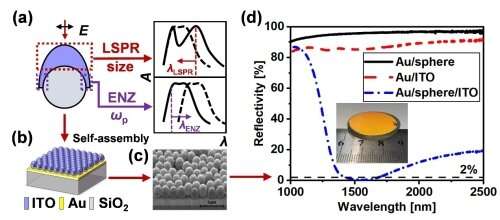
Researchers from the Shanghai
Institute of Optics and Fine Mechanics (SIOM) of the Chinese Academy of
Sciences have recently proposed a design concept for a tunable broadband
perfect absorber based on non-split coupling of Epsilon-near-zero (ENZ) and
localized surface plasmon resonance (LSPR) modes.
The researchers designed a sub-wavelength single-layer Indium Tin Oxide (ITO) ellipsoidal shell array to excite spatially separated ENZ and LSPR modes, which achieved more than 98% light absorption in the range of 1,435–1,680 nm. A centimeter-level absorber was fabricated by low-cost self-assembly technology and features polarization-independent, wide-angle, and tunable resonant absorption. Related results were published in Applied Surface Science.
Optical absorption is critical in many linear and nonlinear optical applications. In recent years, planar ENZ materials have provided effective solutions for various narrowband, broadband, tunable perfect absorbers. However, planar ENZ materials for perfect absorption face significant polarization dependence and oblique incidence problems, which limit its application. Combination of ENZ films with metasurfaces is thought to solve the above polarization and angle dependence problems. However, reported metasurface schemes inevitably involve complex designs, multi-step fabrication, and expensive FIB or EBL techniques, which limit the device size to the order of hundreds of microns.
In this work, the researchers proposed a broadband perfect absorber scheme based on semi-sphere patterned ENZ films. The core idea of the perfect absorber is to utilize the unique ultrathin film and nanoparticle characteristics of the semi-ellipsoidal shell ENZ film to excite spatially separated ENZ and LSPR resonance modes, thus achieving broadband perfect absorption.
The unique structural symmetry enables the absorber to exhibit polarization-independent and wide-angle features, while the active tunability of ENZ materials endows the absorber with tunability, according to the researchers.
In addition, the perfect absorber is compatible with self-assembly technology, enabling low-cost manufacturing of centimeter-scale or even wafer-scale devices.
In addition to ITO material, the perfect absorption scheme proposed in this study is also applicable to other ENZ materials with both ENZ and plasmon properties, such as cadmium oxide (CdO), ZnO: Al (AZO), titanium nitride (TiN), etc., which is conducive to the realization of broadband perfect absorption in more wavelength ranges.

 Previous page
Previous page Back to top
Back to top







